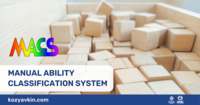The Manual Ability Classification System (MACS) was designed specifically for children with cerebral palsy aged 4-18 to emphasize the importance of hand function for independence in daily life (equivalent in importance to the Gross Motor Function Classification System (GMFCS)).
MACS aims to determine the level of hand functionality that best fits a child's typical behavior, rather than their maximum capabilities. This means that the level is determined by asking someone who knows child well about his or her abilities, and not by conducting a special assessment.
Also, MACS does not explain the reasons for the limitations of the hand function and is not intended to classify the types of cerebral palsy (CP). The classification is designed to emphasize the importance of hand function for independence in daily life, learning, traveling, self-care, leisure, etc.
The practical value of the proposed classification lies in the formation of a common language in communication with families and between professionals in institutions and its use to set goals and identify groups for research.
The MACS classification includes 5 levels by analogy with the GMFCS (Gross Motor Function Classification System).
- Level I - the child handles objects easily and successfully.
- Level II - the child handles most objects but with somewhat reduced quality and/or speed of achievement.
- Level III - the child handles objects with difficulty; needs help to prepare and/or modify activities
- Level IV - the child handles a limited selection of easily managed objects in adapted situations.
- Level V - the child does not handle objects and has severely limited ability to perform even simple actions.
Mini-MACS is a MACS adaptation for children aged 1 to 4 years. It was developed to describe how children with CP use their hands in daily activities.
Mini-MACS classifies children's ability to handle and manipulate objects that are important in their age, as well as their need for support and assistance in such situations.
Mini-MACS describes how children typically use their hands to handle objects such as toys in a variety of settings. In other words, it describes what they usually do, not what is known to be their best ability.
Mini-MACS classifies a child's general ability to manipulate objects, not the function of each hand separately. This classification also has 5 levels, similar to the MACS classification.
The MACS classification was developed in 2002 and translated into 25 languages. Translation into Ukrainian was performed by the team of the Kozyavkin International Rehabilitation Clinic. The Mini-MACS classification was developed in 2016.
The official website of the MACS classification is http://www.macs.nu.
You can download the MACS classification (original English version and translations to other languages) from this page.
You can download the Mini-MACS classification (original English version and translations to other languages) from this page.

